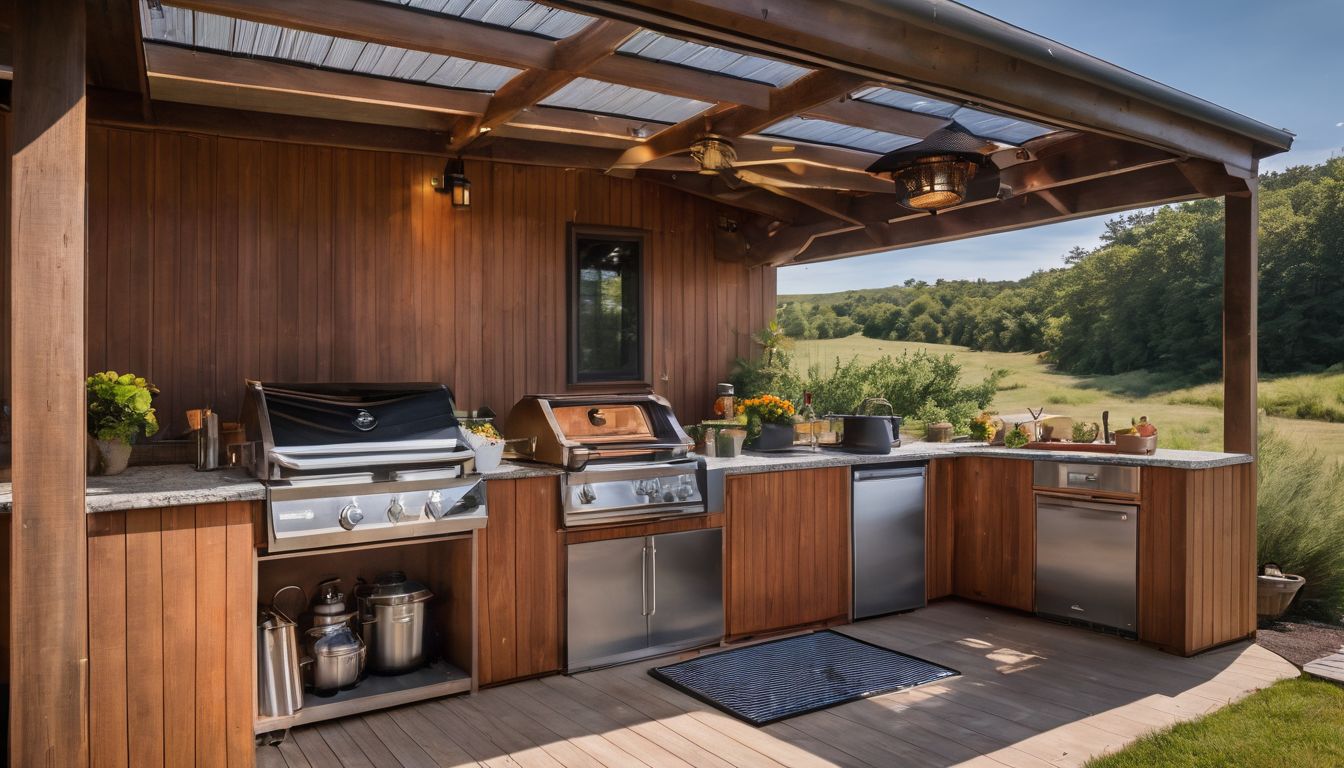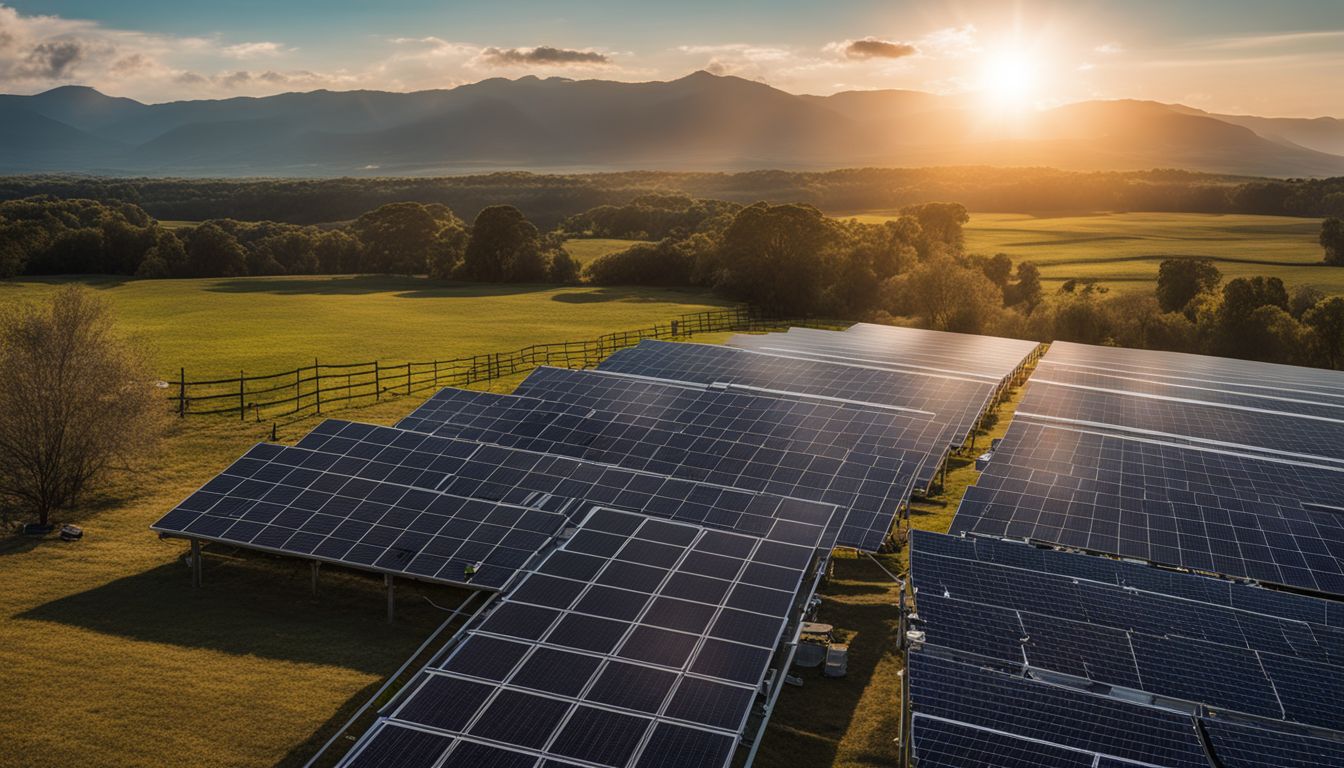Can a 5kW inverter power a stove?

Determining whether a hefty appliance like a stove can be powered by a 5kW inverter is a common puzzle for many homeowners. Surprisingly, this robust inverter can churn out up to 20 kWh daily, which hints at its capacity to support various household needs.
This article dives into the depths of powering stoves with solar technology and offers clarity on what such an inverter system can achieve. Let's find out more.
Key Takeaways
- A 5kW inverter changes DC from solar panels into AC for home use and can power many household items but might struggle with high-energy ones like stoves.
- To see if a stove will work, you must check its wattage against the inverter's output. Safety is important, so don't overload the inverter.
- Your system needs enough batteries to match the energy used by your appliances; at least four 12V 200ah batteries are recommended for smooth operation.
What is a 5 kW inverter?
A 5 kW inverter is a device that changes direct current (DC) into alternating current (AC). You can find DC in batteries and solar panels. The inverter makes the DC electricity usable for your home's AC devices.
With a 5kW, or 5000-watt, capacity, it can handle quite a bit of power. Think of it like a bridge that allows energy to flow from solar panels or batteries into useful power for things like fridges and TVs.
This kind of inverter works well for larger homes or offices because it has enough strength to keep several items running at once. It could manage some air conditioners along with different household appliances without breaking a sweat.
Solar systems with a 5 kW capacity are becoming popular as they offer a good balance between size and power output, often just right for daily use, especially when paired with battery storage to hold extra energy.
https://www.youtube.com/watch?v=LLfU47Zs3Qc
The Functionality of a 5kW Inverter

This kind of inverter can manage a lot of power. It takes direct electric current from solar panels and changes it into alternating current for your home. You can run many things at once, like lights, fridges, and computers.
It's tough enough to handle even air conditioners in a big house. When the sun shines brightly, it might produce up to 20 kW per day. This means you could keep your whole place powered up just with energy from the sun!
https://www.youtube.com/watch?v=Evc0wanMHRk
Appliances a 5kW Inverter Can Power
A 5kW inverter has the capacity to power a range of general household appliances, including kitchen appliances such as stoves. To understand how this is possible and what factors influence it, continue reading.
https://www.youtube.com/watch?v=7reC9QlPHlA
General Household Appliances
- Lights: It can power LED lights, saving energy while lighting up your home.
- TVs: You'll be able to watch your favourite programmes without worry.
- Computers: Keep working or playing games on your computer.
- Refrigerators and freezers: Your food stays fresh, and frozen treats stay cold.
- Microwave ovens: Heat up meals quickly and easily.
- Washing machines: clean clothes are just a cycle away, without stressing the power supply.
The Specific Case of a Stove
Stoves can be tricky for a 5kW inverter. These kitchen appliances need lots of power to heat up and cook food. If you want your solar power system to run a stove, it might not work with just a 5 kW inverter.
Most electric stoves need more energy than this, and some people don't even try to connect them.
You must check how much power your stove uses. Compare that number with what the 5 kW inverter can provide. Remember, safety comes first. Don't push the inverter beyond its limit because it could break or cause problems.
It's best to use the stove on grid power or get a bigger inverter if needed for safe cooking.
Factors Influencing What a 5kW Inverter Can Power
The power produced by the system, the power requirements of appliances, and the number of batteries needed all play a role in determining what a 5 kW inverter can power. Read on to learn more about these factors and how they impact the functionality of your inverter.
Power Produced by the System
A 5kW inverter gives you a strong 5,000 watts to work with. It's like having your own mini-power station at home. Inverters are great because they turn the DC electricity from solar panels into the AC electricity we use every day.
You can connect a lot of things to this kind of system—lights, TVs, and even fridges.
But stoves? They need lots of power to heat up fast. Your inverter has enough juice for some smaller stovetops or microwaves. However, big ovens might be too much unless you only run them by themselves.
Just make sure you check how many watts they need before turning them on!
Power Requirements of Appliances
Different gadgets at home need different amounts of energy. This is important because a 5 kW inverter can only give power up to 5 kilowatts. If an appliance needs more energy than this, the inverter won’t work for it.
Take things like lights or a TV; they don't use much power, so a 5kW inverter can easily handle them. But other items like stoves and water heaters need more energy to work. Before using your inverter, you must check how much power each thing uses.
That way, you can be sure your appliances will run smoothly without overloading the system.
How Many Batteries are Needed for a 5kW Inverter???
Running a 5kW inverter requires a good number of batteries. The right amount ensures your system will work well.
- You need at least four 12V batteries to make your 5kW inverter run properly. This is the bare minimum.
- To keep things running smoothly, each battery should be big and strong; think about getting 200AH batteries.
- If you want to go off-grid with your solar setup, consider using six of these 200-ah batteries joined together. This makes a powerful battery bank.
- Your battery bank must match the energy output of all the things you want to use. So, if you're going to power up heavy items like stoves, you'll need enough stored power.
- It's not just how many; it's also how you connect them. Make sure they are hooked up right, so your system is safe and works as it should.
- Check on your batteries often. This helps avoid surprises and keeps everything working for longer.
- Think about what happens if there's no sun for a couple of days. Having extra batteries means you still have power when you need it.
- Always use similar types of batteries together—mixing different kinds can cause big problems.
- Remember that over time, batteries may lose their strength. Plan ahead and be ready to replace old ones when the time comes.
Conclusion
In conclusion, a 5kW inverter has the capacity to power various household appliances, including big-sized houses with multiple AC units. However, when it comes to powering a cooker, it's essential to consider the total power of all loads and the energy requirements of other appliances being powered simultaneously.
The suitability of a 5kW solar inverter for off-grid use depends on these factors, making it crucial to assess the specific energy needs before determining if it can effectively power a cooker.
Additionally, understanding the load capacity of the inverter is vital when deciding which appliances it can efficiently support.
FAQs
1. What does a 5 kW inverter do?
A 5kW inverter converts DC power from sources like solar PV panels into AC power, which we use to run electrical appliances at home.
2. Can this type of inverter power my stove?
It depends on the stove's wattage; if it's less than or equal to 5kW and the peak power of the inverter can handle it, then yes, your stove can be powered by a 5kW inverter.
3. What other devices can I use with a 5 kW solar inverter?
You can run several household devices, such as lights, a refrigerator, or fans; just check that their total energy consumption stays within the 5 kW limit.
4. Is there anything special about using an inverter for cooking appliances?
Yes, you need to make sure your hybrid inverters have enough output for high-energy-use appliances and that they provide clean sine wave electricity for safe operation.
5. Will I get backup power from my hybrid solar system if there’s load shedding?
Absolutely! With battery storage connected to your photovoltaic system and a good charge controller managing it all, you'll have backup when mains electricity is down.
6. How do batteries fit into this setup?
Energy storage plays a big part; lithium batteries connected to your photovoltaic (PV) system store energy, so even after sunset or during power cuts, you still have electricity.











